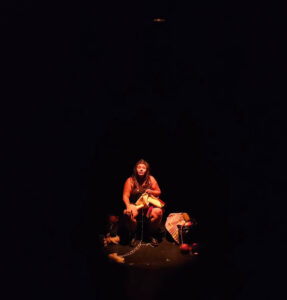With the Toronto Fringe drawing to a close yesterday, the circuit will continue to move westward as it does every year, with artists and zealous audience members travelling to Winnipeg, Saskatoon, Edmonton, Calgary, Vancouver and/or Victoria to keep the Beer Tent Parties going all summer long! Yet this year, I hope that all eyes will be fixed on The Atlantic Fringe Festival, in Halifax, as it begins an exciting new chapter in its history and development!
The Atlantic Fringe Festival was founded in Halifax in 1991 by Ken Pinto and for at least the last decade it has been a subject of conflicting opinions amid the theatre artists of Halifax and those who patronize them. On one hand, most are vehemently united in the opinion that having a Fringe Festival in Halifax is an absolute necessity for this community and so Pinto’s role in spearheading this initiative twenty years ago cannot be dismissed entirely. At the same time, however, as a small festival peppered with organizational problems that, year after year, never seemed to get addressed, and an infrastructure that seemed to alienate Halifax’s theatre artists rather than belonging to them, Atlantic Fringe became the source of much frustration, contention and, to some degree, embarrassment, for the very people it was supposedly trying to serve.
Back in April, 2011 Ken Pinto issued a statement that he had decided to take a two-year hiatus from the Atlantic Fringe Festival to focus on another project, the Titanic 100 Festival, which will commemorate the sinking of the doomed ocean linear in 2012. Halifax has deep historical connections to the Titanic, as it was one of the ports where bodies were brought to be buried, being the closest sea port with railway connections to the wreckage site at the time. Pinto did not release a formal statement about his decision regarding the Fringe Festival, nor did he consult with the theatre community or even the Fringe’s own Board of Directors, he claimed that he searched for a replacement among people he has worked with on the Festival but that he “didn’t think the people who were interested in taking over had the management skills yet,” although he did not create a job posting to advertise the position or to let people know that Atlantic Fringe was at risk of being without a Director. He then let crucial deadlines for government funding go by without applying, a decision he made without the knowledge of the community or Atlantic Fringe’s Board of Directors, which would make it especially difficult for anyone else to seek to produce the 2011 Festival in his place.
The Canadian Association of Fringe Festival (CAFF)’s president, David Jordan, issued a statement saying, “We were concerned. There didn’t seem to be a connection to the community.” He also reminded Haligonians that if a Fringe Festival is inactive for 18 months, its designation as a “Fringe” (a term which is trademarked by CAFF) can be removed.
The theatre community of Halifax was, understandably, immediately outraged, confused and mobilized in a way that was both immediate, acutely organized and filled with passion, optimism, camaraderie, pride and a sincere commitment to taking back the Atlantic Fringe Festival and making it their own. A few days later, under the leadership first of Michael McPhee and then Stewart Legere and Kevin Kindred, dozens of members of the community crowded into The Cultural Federation of Nova Scotia on a dreary and very rainy April morning. To some surprise, Ken Pinto attended the meeting, which was focused far more on creating solutions and moving forward than focusing on the past and casting blame. Bruce MacLellan, who was on the Board of Directors for Atlantic Fringe, was also in attendance and spoke at length about the Board’s current stance on the hiatus and the future of the Festival. Ultimately, both Pinto and MacLellan agreed that their concern lay with transferring the responsibility of producing the Fringe Festival to the right person. Pinto’s lack of faith and confidence in the skills and abilities of Halifax’s independent theatre artists was blatantly clear throughout the meeting and, as he told The Coast, speaking about The Bus Stop Theatre “It’s a gamble if they take it over— I’m worried it might fail.”
The outcome of this meeting left the Atlantic Fringe Festival in the passionate and capable hands of Thom Fitzgerald, current Artistic Director of Plutonium Playhouse, a successful film director whose first play, Cloudburst, which premiered at the Plutonium Playhouse, was hailed, “the best thing to happen to the Halifax theatre scene in a decade!” A small group of about twenty met subsequently to brainstorm on the logistics of the 2011 Festival, and their team was eventually whittled down to a smaller number, which now includes Atlantic Fringe Board Members Garrett Barker (President), Lisa Rose Snow, Kevin Kindred and Adam Reid. Charlie Rhindress, Associate Artist at Neptune Theatre, spoke on behalf of that theatre and its Artistic Director, George Pothitos, saying that they would be pleased to donate the space as one of the venues for the 2011 Fringe Festival. Other venues that have been confirmed (and many donated or given at reduced rates) are The Bus Stop Theatre, The Plutonium Playhouse, DANSpace and the Theatre Nova Scotia Living Room. The Atlantic Fringe applications were due July 7th and the Festival begins September 1st and runs until September 11th.
I feel compelled to write about what I see as being a trend in the Halifax theatre scene right now, an exciting and hopeful trend that I think is going to bring great, and potentially rapid, changes to Halifax’s theatrical tradition and the role that the theatre plays in the lives of Haligonians. In the past, there have been a few theatre institutions, such as the Fringe Festival, which have seen individuals with paper-thin connections to Halifax’s theatre artists and the community that they have developed here in positions where they were able to exert massive amounts of control over the way that Halifax’s theatre scene did or did not develop, grow and reflect the creativity, zealous enthusiasm, professionalism, talent and community spirit of the artists who live here. Over the last few years, Halifax’s theatre artists have not only been continuously demonstrating their pioneer and innovating fortitude by continually producing new work against all challenges of too few venues and little to no press and media exposure, and steadily building a whole infrastructure for themselves to encourage new work to be written, developed and allowing larger and more established companies like Zuppa Theatre and 2b Theatre to grow and flourish.
The fact that Ken Pinto doubted this community for even a moment shows how out of touch he was with the theatrical tradition in Halifax. The 2011 Fringe Festival is already going to be a small theatrical miracle, the Little Festival That Could, buoyed up by the love and the support of the community that it rightfully belongs to. Yet, what is most exciting to me is the knowledge that now, throughout the next few years, the Atlantic Fringe Festival will begin to grow and thrive and to feed back into the community that it has emerged from.
It used to be that after a play was produced at Atlantic Fringe it disappeared into the abyss of time. But now, with the development of the Plutonium Playhouse, a theatre company dedicated to producing Haligonian plays, festivals such as the Queer Acts Festival and the SuperNova Festival, which have revived revamped productions of Fringe successes, as well as Neptune Theatre having a renewed interest in producing the work of local playwrights, and, it has been suggested, may be in the midst of creating its own dramaturgy/playwrights in residence program, there are lots of opportunities for theatre productions and theatre companies that rise out of the Fringe to go on to have life far beyond it. The Fringe Festival, after all, is supposed to be a launching pad for this exact experience. As this continues, the quality of the indigenous work that comes out of Halifax will been enhanced, which will likely see more Halifax-based artists touring their work outside the province (as Zuppa and 2b already do) and participating in other theatre festivals across the country and around the world. As the notoriety of Halifax’s artists intensifies, not only will the Atlantic Fringe Festival see more applications from artists across the country, likely causing the Festival to grow larger, to add more venues and more performances, but also there will be more opportunities for Halifax-based artists to do work with higher budgets and greater resources. In time, who knows, we may even have a beer tent!
I couldn’t be more proud of the Halifax theatre community, who continue to amaze and impress me with how much they are continually able to accomplish. Like a cornucopia of Rumpelstiltskins they weave theatrical magic from nearly nothing and they prove every day that although small, they are mighty and that someday very soon, Halifax is going to receive national exposure for fostering a wide array of world-class theatre artists. If the caliber of productions that seems to be pouring forth from a very small community is inspiring and strong with few resources and a wide array of logistical challenges in a city that faces ongoing economic hardship and where, in general, the arts is not as inherently engrained into the fabric of the city as in larger urban centers, I can only imagine what marvels lie in store for us.
The one thing that I would say to my compatriots in Halifax is that, in my opinion, Halifax should be a place where artists are embraced with a welcoming spirit and that those who live and work here should allow themselves to swept up in the victorious and progressive energy out of which the 2011 Atlantic Fringe Festival has been hatched. It’s easy, I think, for people who continually have to work harder and face bigger obstacles than others to grow war weary and bitter or to bind together to the exclusion of others. This is easily justified, but I think, self defeating. The more fun we all have while building the theatre tradition that will be our legacy, the more we will enjoy reaping the fruits of our labour and the more than we bring in visitors from other provinces, other countries and cities into our community, the more we eat and drink and make them feel at home here, the more artistic opportunities will emerge for everyone.
The future belongs to Halifax. The rest of the country ain’t seen nothin’ yet!







